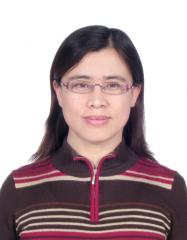
- 姓 名:
- 耿海燕
- 职 称:
- 教授 博导
- 研究领域:
- 认知神经科学 视觉意识 注意 内隐社会认知
- 通信地址:
- 永利集团王克桢楼 100080
- 电子邮件:
- hygeng@pku.edu.cn
yl23411永利教授、博士生导师。1998 年于永利集团心理学系(现yl23411永利)获得理学博士学位,并留校任教至今。1998 年 7 月至2002 年 7 月 永利集团心理学系(现yl23411永利)讲师。1999 年 1 月至5 月 美国 University of Michigan 访问学者 。2002 年 8 月至2017年7月为永利集团心理学系(现yl23411永利)副教授,2017年8月至今为yl23411永利教授。主要研究视觉意识、注意、内隐社会认知的心理及脑机制。
耿海燕获得的荣誉和奖励包括:永利集团2001-2002年度教学优秀奖;永利集团2003年度岗松奖教金;作为主讲教师之一,本科生的主干基础课“实验心理学”于2005年被评为国家精品课程;作为主要成员,“实验心理学教学改革与教学辅助系统建设”于2005年获永利集团教学成果一等奖,获北京市教学成果二等奖;入选2007年教育部“新世纪优秀人才支持计划”;永利集团2010-2011年度树人奖教金。
认知心理学 认知神经科学
¨ 意识与无意识加工的心理及脑机制研究
并非所有的认知加工过程都一定伴随着主观体验( subjective experience ) , 外界刺激信息可以在不被觉知的情况下影响人的行为。意识觉知( conscious awareness )是如何产生的,它的心理及神经机制是什么?这是认知神经科学家关注的一个热点问题。
¨ 内隐社会认知( Implicit social cognition )的心理及脑机制研究
人类本质上是不断和其他个体及整个外部环境进行互动的社会动物,认知功能的演化和发展也在某种程度上由社会活动所塑造,以满足人际互动和社会环境的需求。而人类认知功能的社会适应性的体现之一是可以以一种高效、自动化的方式来处理社会信息,并产生相应的心理和行为反应。这种高效和自动化使各种社会认知功能能够以平行、自发的方式执行,较不容易受到认知资源限制的影响,因此赋予人类认知功能更大的适应性。 这就是内隐社会认知研究的出发点。
科研项目 :
1. 国家自然科学基金(批准号:31671131),“内隐视觉观点采择的认知及神经机制研究”, 2017年01月— 2020年 12月,项目负责人。
2.国家自然科学基金(批准号:31271202)“注视加工中的内隐社会认知及其神经机制”, 2013年1月—2016年12月,项目负责人。
3. 中央高校基础科研项目(the Fundamental Research Funds for the Central Universities)“多感觉通道信息整合与运动控制” 2010年4月-2012年3月,项目组成员。
4. 国家自然科学基金项目(批准号:30870763)“无意识自我加工及自我意识的心理与脑机制研究”,2009年1月—2011年12月,项目负责人。
5. 北京市自然科学基金资助项目(批准号:7093123)“从错误记忆的角度研究阿尔茨海默病人的记忆障碍”,2009年1月—2010年12月,项目负责人。
6. 教育部哲学社会科学研究重大课题攻关项目(项目批准号:06JZD0039)“人类记忆的多重机制及其能力培养研究”子课题“记忆的脑机制研究”,2006年1月-2008年12月,项目组主要成员。
7. 国家自然科学基金项目(批准号: 30470570)“视觉意识的心理及脑机制研究”, 2005 年 1 月— 2007 年 12 月,项目负责人。
8. 国家自然科学基金项目(批准号: 30100053)“关联性记忆错觉的脑功能研究”, 2002 年 1 月— 2004 年 12 月,项目负责人。
英文论著
Zhou, S. #, Xu, Y. #, Wang, N., Zhang, S., Geng, H.*, Jia, H.*(2020) Deficits of subliminal self-face processing in schizophrenia. Consciousness and Cognition, 79:102896.
Wang, N. #, Xu, S. #, Zhang, S., Luo Y. & Geng, H.*(2019) ERP evidence on how gaze convergence affects social attention. Scientific Reports, 9:7586.
Xu, S., Zhang, S., and Geng, H.* (2018). The effect of eye contact is contingent on visual awareness. Frontiers in Psychology, 9:93.
Yuan, X., Wang, N., Geng, H.* and Zhang, S. (2017) Mentalizing Another’s Visual World—A Novel Exploration via Motion Aftereffect. Frontier in Psychology 8:1535.
Zhang, F., Zhang, X., Luo, M. and Geng, H.* (2016) The Effects of Feedback on Memory Strategies of Younger and Older Adults. PLoS ONE 11(12): e0168896.
Luo, Y., Zhang, S., Tao, R., Geng, H.* (2016). The Power of Subliminal and Supraliminal Eye Contact on Social Decision Making: An Individual-Difference Perspective. Consciousness and Cognition, Consciousness and Cognition 40: 131–140.
Cui G, Zhang S, Geng H.* (2014) The Impact of Perceived Social Power and Dangerous Context on Social Attention. PLoS ONE 9(12): e114077. doi: 10.1371/journal.pone.0114077
Luo M, Geng H Y.*(2013). How can survival processing improve memory encoding? Sci China Life Sci, 56: 1028–1037.
Tao R., Zhang S., Li Q., Geng H.* (2012). Modulation of Self-Esteem in Self- and Other-Evaluations Primed by Subliminal and Supraliminal Faces. PLoS ONE 7(10): e47103. doi:10.1371/journal.pone.0047103.
Geng, H.*, Zhang, S., Li, Q., Tao, R. & Xu, S. (2012). Dissociations of Subliminal and Supraliminal Self-Face from Other-Face Processing: Behavioral and ERP Evidence. Neuropsychologia, 50: 2933–2942.
Geng, H.Y. & Xu, S. (2011). Unconscious Self-Processing: subconscious, unintentional or subliminal?”. In Han, S., & Pöppel, E. (Eds.). Culture and Neural Frames of Cognition and Communication (On Thinking). pp 93-107, Berlin: Springer.
Xu, S., zhang, S. & Geng, H.Y.*(2011) Gaze-induced joint attention persists under high perceptual load and does not depend on awareness. Vision Research, 51: 2048–2056.
Zhang F & Geng H Y*. What can false memory tell us about memory impairments in Alzheimer’s disease? Chinese Science Bulletin, 2010, 55 (35): 3989-3997.
Wang M, Geng H Y.* The adaptive characteristics of memory: A perspective from the life-span development of associative memory illusion. Chinese Science Bulletin, 2010, 55(16): 1581−1589.
Li, Q. & Geng, H.* (2009). Progress in cognitive neuroscientific studies of visual awareness. Progress in Natural science, 19(2):145-152.
Geng, H. Y., Qi, Y. Q., Li, Y. F., Fan, S. L., Wu, Y. H., & Zhu, Y. Neurophysiological correlates of memory illusion in both encoding and retrieval Phases. Brain Research, 1136(2007):154-168
Geng Haiyan, Song Qianlan, Li Yunfeng, Xu Shan & Zhu Ying. Attentional Modulation of Motion-Induced Blindness. Chinese Science Bulletin, 2007, 52 (8): 1063-1070.
Geng H Y, Song Q L, Li Y F, Zhu Y. (2005). The effect of attention to distractor on inhibitory processes in selective attention. Chinese Science Bulletin, 2005, 50(16): 1743-1750.
Wu, Y.H. Geng, H.Y. &Zhu,Y. (2003). What We Learn From Cognitive Neuroscience?. Acta Psychologica Sinica, 2003, 35 (增): 1-5.
Geng H. Y., Qi Y. Q., Cai W. J., He Z. J. Li L.(2004). False memory of human faces. The 28th International Congress of Psychology (ICP2004), August 8-13, Beijing China.
Geng H. Y., Li Y. F., Fan S. L. Zhu Y. (2004). Perception With and Without Awareness: an ERP study. ASSC8 (Association for the scientific study of consciousness: The 8th annual meeting), June 25- 28, University of Antwerp, Antwerp, Belgium.
Geng H. Y. & Zhu Y.(2001).Perception Without vs. With Awareness: Typical and Reversed Stroop Effect. The Third International Conference On Cognitive Science, Aug. 26-31, Beijing(China). Oral presentation in Symposium11: High-level Cognition: Theoretical Issues and Applications.
Geng, H. Y. and Zhu Y. (2000). Unconscious perception: Trade-offs Between Attention and Stimulus quality. Proceedings of ASSC4. Consciousness and Cognition, 9(2), s68.
Geng H. Y. and Zhu Y. (2000). Perception Without Awareness: Consciousness, Attention and Stimulus Quality. XXVII International Congress of Psychology. International Journal of Psychology, volume 35(3/4), p453.
中文论著
罗萌, 耿海燕. 生存加工改善记忆编码的机制. 中国科学: 生命科学, 2013, 43: 981–991
张凡,耿海燕*. 从错误记忆的角度透视阿尔茨海默症患者的记忆障碍. 科学通报,2010,55 (30): 2885-2893.
王密, 耿海燕*(2010).从关联性记忆错觉的毕生发展看记忆的适应性特质. 科学通报,55(4-5):307-315。(* 通讯作者)
金鑫,耿海燕,高勇,刘瑜. 空间方位关系在不同认知场境下的模糊性探讨. 永利集团学报(自然科学版),2009,45(6):1025~1032
李奇,耿海燕. 视觉意识的认知神经科学研究进展. 自然科学进展,2008,18(11):1211-1219
石冠楠,耿海燕. 视觉意识及其神经机制. 心理科学,2007,30(5):1136-1138。
耿海燕,钱栋. 记忆的源检测研究及应用. 永利集团学报(自然科学版),2007,43(5):716-722。
耿海燕,宋茜兰,李云峰,许珊,朱滢. 运动诱发视盲现象中的空间注意调控机制. 科学通报, 2007,52(1):548-554.
耿海燕, 蔡文菁. 不注意视盲的实验研究综述. 永利集团学报(自然科学版),2007,43(2):282-287.
耿海燕,宋茜兰,李云峰,朱滢. (2005). 干扰项注意水平对选择性注意抑制过程的影响. 科学通报, 2005 , 50 ( 15 ): 1613-1619.
齐雅琼 , 耿海燕. (2005). 关联性记忆错觉神经机制的研究. 心理科学 , 2005, 28 (5): 1179-1181.
朱滢,耿海燕 (2005). 从内隐认知与注意看意识问题. 《面向 21 世纪人文社会科学 100 个重大问题》( 507-513 ),山东教育出版社, 2005 ,济南
朱滢,耿海燕,樊春雷. (2003). 记忆、注意和意识. 见:汪云九、杨玉芳等著《意识与大脑—多学科研究及其意义》,人民出版社, 2003 年 9 月。
耿海燕. (2003). Baars 的意识剧院模型. 永利集团学报(自然科学版), 2003 , 39 ( 6 ), 901-907 。
耿海燕,吴艳红,朱滢. (2002). 知觉觉知的神经相关物研究. 心理科学, 2002 , 25 ( 6 ): 716-719 。
耿海燕,李云峰. (2002). 分散和集中注意条件下的 Stroop 效应:意识的影响. 永利集团学报(自然科学版), 2002 , 38 ( 3 ): 421-426 。
耿海燕 , 范思陆, 李云峰,朱滢. (2002). 知觉意识的认知神经科学研究. 心理学报, 2002 , 34 (增) , P91.
耿海燕,朱滢. (2001). Stroop 效应及其反转:意识和无意识知觉. 心理科学, 2001 , 24 ( 5 ): 553-556 。
耿海燕,朱滢. (2001). 意识和无意识知觉:注意和刺激特性间的相互补偿. 心理学报, 2001 , 33 ( 5 ): 390-397 。
耿海燕,朱滢,李云峰. (2001). 错误再认:意识、注意和刺激特性. 心理学报, 2001 , 33 ( 2 ): 104-110
耿海燕,张述祖. (1996) . 汉语语句句法表征及命题表征能力的年龄比较. 心理学报,28(3): 252-259